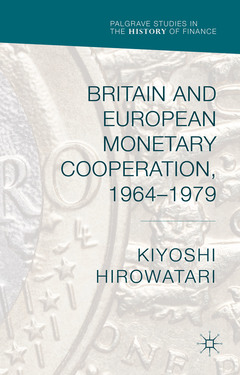Britain and European Monetary Cooperation, 1964-1979, 1st ed. 2015 Palgrave Studies in the History of Finance Series
Auteur : Hirowatari Kiyoshi

PART I: THE CONSERVATIVES AND EUROPEAN MONETARY COOPERATION
1. The Conservatives and European Monetary Cooperation
2. The Conservatives and Monetary Sovereignty
3. The Heath Government and External Economic Policy
PART II: LABOUR AND EUROPEAN MONETARY COOPERATION: LABOUR AND STERLING
5. Harold Wilson, the 1964?66 Sterling Crisis and ' 'the Second Try ' '
6. The European Approach versus Sterling?Dollar Diplomacy
7. The 1976 IMF Crisis and its Aftermath
Conclusion
Appendix I Central Bank Cooperation (1963?1976)
Appendix II Short-term Aid Facilities 1964?1967
Appendix III Comparison between the 1967 Devaluation Crisis and the 1976 IMF Crisis
List of Names
Notes
Bibliography
Index
Kiyoshi Hirowatari teaches History of International Trade, International Finance and Globalization at Hirao School of Management, Konan University, Japan. He studied at both Kyoto and Cambridge Universities, obtaining a PhD in History from Cambridge University. He is a Research Associate at the Centre for Financial History at Darwin College, Cambridge and a member of the Economic and Social History University academic staff. He is a member of the Socio-Economic History Society of Japan, and has held professional positions at the Bank of Tokyo. Kiyoshi Hirowatari's research interests lie in monetary diplomacy between Britain and Europe.
Date de parution : 08-2015
Ouvrage de 276 p.
14x21.6 cm
Disponible chez l'éditeur (délai d'approvisionnement : 15 jours).
Prix indicatif 126,59 €
Ajouter au panier


